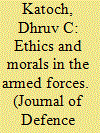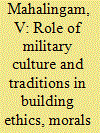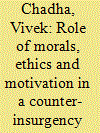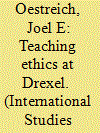| Srl | Item |
| 1 |
ID:
118330


|
|
|
|
|
| Publication |
2013.
|
| Summary/Abstract |
Value systems form the spine of modern society, religion and every individual's conscience with moral codes defining 'appropriate' and 'expected' activity. Ethics refer to an individual's actions that are consistent with such value systems. While the former constitutes a basic human marker of right behaviour and conduct, the latter are a set of guidelines that define acceptable behaviour and practices for a certain group of individuals or society. Within this construct, this article traces the origin and growth of Indian and Western ideas on the subject and probes similarities between the two. The article thereafter dwells on the perceived decline in moral values in India-a widespread belief-even though no empirical study exists to substantiate this claim. The author then suggests that the focus needs to shift from a perceived 'ethics crisis' to how ethical leadership can be strengthened within the armed forces.
|
|
|
|
|
|
|
|
|
|
|
|
|
|
|
|
| 2 |
ID:
118329


|
|
|
|
|
| Publication |
2013.
|
| Summary/Abstract |
There has been a palpable decline in the standards of morals, ethics and values as observed by officers in the armed forces and the bond between officers and men has weakened. This could be because officers with the requisite qualities are not adequately groomed to rise to the level of battalion commanders. The present appraisal system is largely to blame, it being based on a single Annual Confidential Report. A further drawback is that only superior officers report on a ratee. Inputs for appraisal need to be drawn from multiple sources geared towards a '360 degree evaluation'. The appraisal system should enforce accountability in officers, facilitate their continuous improvement, reward competence and sincerity, recognize efficiency, and confirm an officer's suitability for the post. It should encourage both an officer's career development as well as self-development linked to organizational goals. The system must thus evaluate both mission accomplishment and organizational development.
|
|
|
|
|
|
|
|
|
|
|
|
|
|
|
|
| 3 |
ID:
118326


|
|
|
|
|
| Publication |
2013.
|
| Summary/Abstract |
Developing culture and traditions is one of the pragmatic ways of breeding ethics and moral standards in the military. These moral issues are profoundly linked to the military's way of life and ethos, which includes discipline and esprit de corps. Although issues like developing a sense of belonging may be the theme while creating cultures, the ultimate aim is to influence a soldier into becoming an ethical team player as an instrument for winning wars. The creation and pursuit of culture establishes common values and a sense of ownership amongst the troops. The military family thus created prevents individuals from doing the unethical. The pride in a soldier forces him to protect the honor of his military family, if need be by making the supreme sacrifice. This article elucidates military culture and traditions besides explaining their relevance to ethics.
|
|
|
|
|
|
|
|
|
|
|
|
|
|
|
|
| 4 |
ID:
118323


|
|
|
|
|
| Publication |
2013.
|
| Summary/Abstract |
Morals, ethics and motivation are the bedrock of the Indian Army, since it is considered more than a profession: a way of life. These qualities are put to test under most conditions of soldiering; however, there cannot be a more difficult environment than involvement of an army in protracted counter-insurgency (CI) operations. The conditions faced pose peculiar challenges, which force a soldier to adapt. This adaptation can potentially become a morally corrupting influence unless the ethical standards of a force and its moral bearings continue to guide actions. This is also an important determinant for leading a motivated army in such operations. This article assesses the circumstances and peculiarities of CI operations, the linkage between morals, ethics and motivation, impact of poor implementation of these values, and the measures to sustain a high-value system. Finally, it analyses the impact of these factors on the realities of CI operations.
|
|
|
|
|
|
|
|
|
|
|
|
|
|
|
|
| 5 |
ID:
113736


|
|
|
|
|
| Publication |
2012.
|
| Summary/Abstract |
Although international politics is an area resistant to moral thinking, this paper argues that it is important to ground students in the basics of international ethics. This is true because some of them will become international affairs professionals; but all will be citizens who need the tools to think critically about their nation's foreign policies. Also, ethical thinking provides a very good way to critique mainstream theories of world politics, by calling into question some of their basic tenets, particularly when these are defended as "rational" and thus beyond criticism. Most textbooks, however, pay too little attention to these problems. A few ways to overcome these shortcomings are suggested.
|
|
|
|
|
|
|
|
|
|
|
|
|
|
|
|